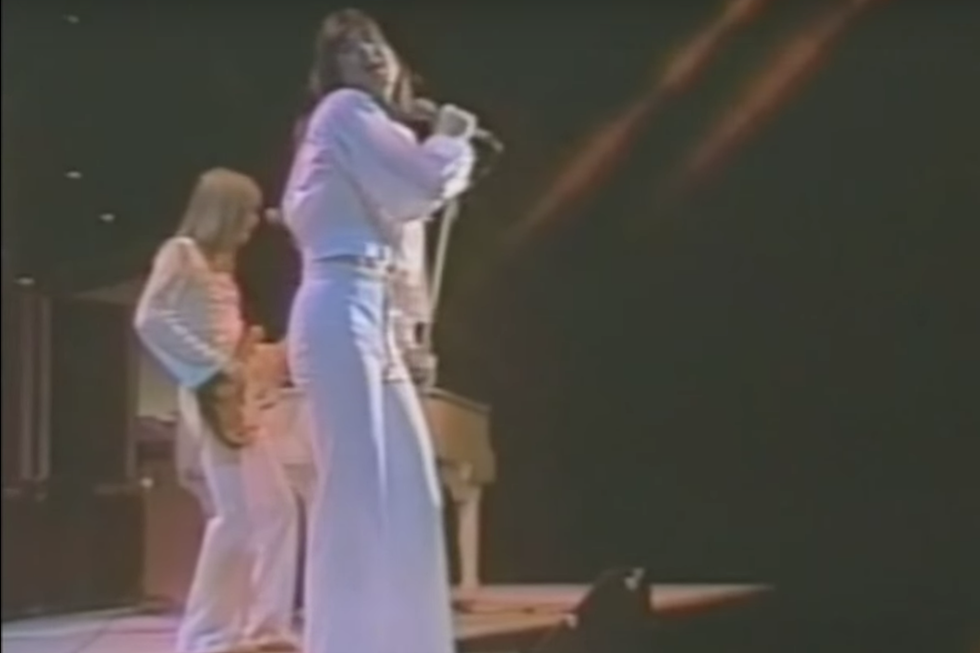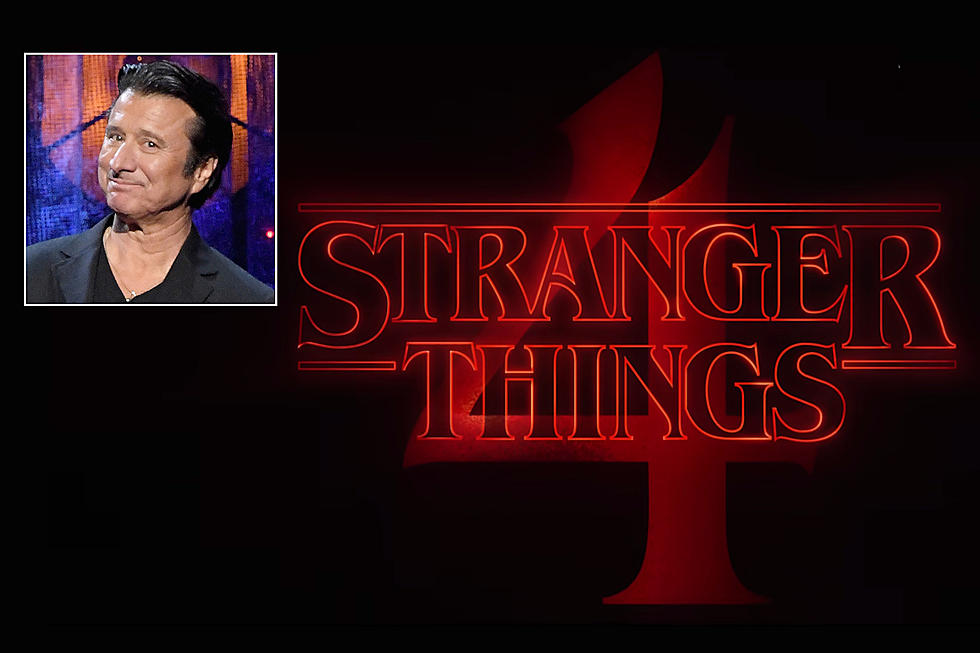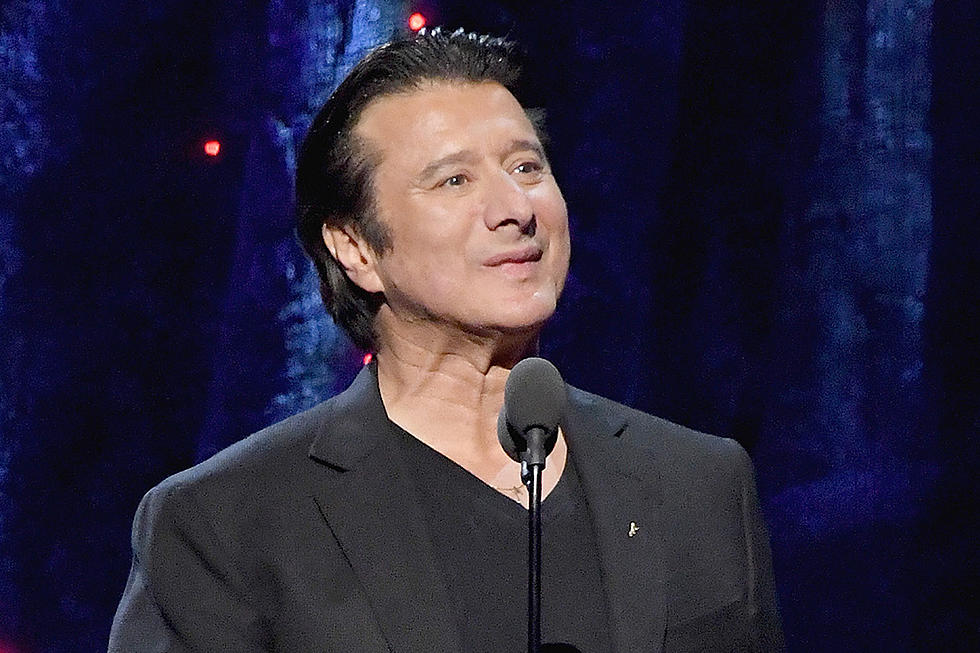
When Steve Perry Performed His First Show With Journey
As the new frontman for Journey, Steve Perry had a suspicious audience to win over.
The date was Oct. 28, 1977, according to the liner notes for Journey's expansive Time3 box set, at the Old Waldorf in San Francisco. Journey co-founder Neal Schon says nobody was quite sure what to make of the recently installed singer, dressed in all white.
"I remember the first night that Steve Perry came onstage with us, and we played a couple of the songs that we had written. The audience was like, 'I don't know about that,'" Schon told Goldmine in 2013. "It was so different that it really kind of threw them off course."
Journey introduced him slowly, playing their full set without Perry, then bringing him on for an encore (which included the newly composed "Lights") at the intimate, 600-seat venue. In truth, this easing-in process worked to their benefit. After all, his bandmates were used to free-form prog-influenced instrumental work rather than the tighter-focused songs they had started constructing with Perry.
Put simply, they weren't so sure, either. "I had some problems when I first joined," Perry told Record Review in 1981. "There was the band, with three albums and a lot of road touring behind it, and all of the sudden there was this singer up there with the range of a soprano. They were going, 'What the hell is this?'"
Perry's circuitous path to that night at the Old Waldorf began when Journey still had their previous singer, Robert Fleischman. After a trio of under-performing jam band-type albums, Columbia Records demanded that they update their sound. That led to Fleischman, who clicked with Schon, co-composing three songs – "Anytime," "Winds of March" and "Wheel in the Sky," Journey's first charting single – that subsequently showed up on 1978's Infinity.
"I think Neal, who didn't want [Perry], wanted Robert," the band's original manager Herbie Herbert says in Don't Stop Believin': The Untold Story of Journey. "And then, when he realized how good he was, Neal was happy with the change. But it was a struggle; I had to shove him down Neal's throat."
They hit the road as an opening act for Emerson, Lake and Palmer, but Journey fans weren't connecting with Fleischman. That's when Herbert brought Perry in, first during an introductory band rehearsal and later – after Fleischman's inevitable ouster – as an offstage apprentice. A couple of shows in, they finally let Perry sing at the Old Waldorf, but only after Journey had finished their regular set.
"They didn’t want to make it with a lead singer," Perry told GQ in 2008. "They wanted to make it without one. They had [former Santana singer and keyboardist] Gregg Rolie, and that was enough. And he was a great vocalist for what they were looking for, but they didn’t want to have a singer out front. I can't speak for them, but I'm sure that if they could have been successful the way they originally set out to be, that would have been fine with them."
This was all a whirlwind for Perry, whose biggest exposure before joining Journey had been singing jingles on local commercials. He'd assembled a band called Alien Project that was reportedly in line for a contract with Columbia when their bass player was killed in an car crash. Their demo eventually landed on Herbert's desk, and he became the advocate that Perry needed.
"I wasn't completely sold on Perry," Rolie admits in the Time3 liner notes. "I don't think anybody was." Then, backstage at the Swing Auditorium in San Bernardino earlier that month, Perry grabbed Journey co-founder Ross Valory's bass and played a snippet of the still-unfinished "Lights." As they all began harmonizing, Rolie said, "It dawned on me right then that this could really be great."
Schon also began to warm to Perry, co-composing their first song together after a show in Colorado. "Immediately when Steve and I got together, I knew that we had chemistry," Schon told Goldmine. "I sat down with an acoustic guitar, and we were in one room in a hotel and I had these chords for ‘Patiently,’ and he just started singing and writing lyrics. And you know, within, I’d say, 45 minutes we had that song. And then the next one we did together — like in about 40 minutes again — it was ‘Lights.’ And it was just pretty much listening to him sing and me humming a few things, and organizing the chords, the arrangement and adding a few sections. That was that.”
"Patiently" would ultimately be one of four tracks credited to the songwriting duo on Infinity. From there, Perry eventually won everyone over, first with hard work and then with undeniable charisma. Perry had co-writing credits on eight of the 10 songs on Infinity, which nearly cracked the Billboard Top 20 – landing 64 places higher than Journey's best-charting pre-Perry album, 1977's Next. Eventually, it would earn multi-platinum sales.
But that was months away at this point. In the meantime, everyone on the outside was still getting used to the seismic changes happening within the group. "There were some die-hard Journey fans – but not enough of them to be worried about," Perry told Record Review. "Still, there were enough of them to cause me pain. They'd look at me funny and throw things at me."
He got dinged in print too. A review of Journey's stand at the Old Waldorf, published in the student-run Stanford Daily in October 1977, derisively focused on his nose, accusing Perry of "crooning through his beak" and referring to him, at another point, as "nose hose."
Journey got past this rough patch by staying on the road after the Roy Thomas Baker-produced Infinity arrived in January 1978, playing 172 cities in the U.S., Canada and Europe. Within a year, they were playing arenas, having scored a long-awaited Top 20 hit with "Lovin', Touchin' Squeezin'" – and the Perry-led Journey only got bigger in the decade to come, despite such humble beginnings.
Not everybody got it wrong, by the way. Joel Selvin, writing for the San Francisco Chronicle, said Perry "appeared fully confident and poised, and sang with considerable power." Billboard, meanwhile, later enthused about Infinity, "Journey has long been one of the most exciting of San Francisco bands and one of the most English-influenced too. The Waldorf performances show it to have expanded and improved dramatically in both regards. The combination of Perry's voice and Baker's influence has resulted in a smoother and less ponderous sound."
Rock's 100 Most Underrated Albums
You Think You Know Journey?
More From Classic Rock Q107










